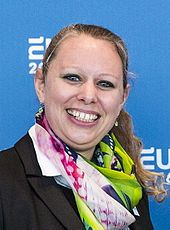Carole Dieschbourg
Carole Dieschbourg (born October 3, 1977 in Ettelbrück ) is a Luxembourg politician ( déi gréng ) and entrepreneur. She has been Minister for the Environment since December 4, 2013.
Life
Carole Dieschbourg grew up on her parents' bacon mill in Lauterborn , a district of Echternach . She graduated from high school in Echternach in 1997 and then studied history and German at the University of Trier . She completed her studies as a Magister (MA) - in her master's thesis she dealt with slavery in ancient Rome - and with the first teaching examination for grammar schools.
From 2005 to 2006 Dieschbourg worked as a project coordinator for the European LEADER initiative Mullerthal , where she devoted herself in particular to the cultural heritage of the region and the creation of a mill inventory. From the end of 2006 to the end of 2013 she worked in the family business Moulin JP Dieschbourg in a leading position, initially as an assistant to the management, and finally since 2011 as managing partner. The mill has been in the family since 1897.
Political career
After completing her studies, Dieschbourg became involved in the “Mouvement écologique” before she joined the green party of Luxembourg (“déi gréng”) in 2008 at the age of 31. In 2009 and 2013 she was a candidate for the Chambre des Députés . In 2010 Dieschbourg founded a local association of their party in Echternach. In the local elections in 2011 déi gréng moved into the local council for the first time, Dieschbourg became parliamentary group leader. Dieschbourg gave up the council mandate after being appointed minister.
On December 4, 2013, Carole Dieschbourg was sworn in by Grand Duke Henri as Minister for the Environment in the cabinet of Prime Minister Xavier Bettel . Dieschbourg is the youngest member of the Bettel cabinet and the only green environment minister in Europe. Your calling was considered a surprise.
Dieschbourg is one of the most popular politicians in Luxembourg.
Political opinions
The devout Catholic advocates the idea of a comprehensive protection of creation, which also includes the protection of art and cultural assets and the preservation of monuments. One of its political goals is to “make people more aware of the value of nature” and to advocate transparency .
Dieschbourg explained its political agenda in March 2014 in an interview with the magazine Revue : Dieschbourg generally relies on more intensive cooperation between the ministries in the field of environmental policy. Their motto is: better education of the population about the environmental status of Luxembourg, intensive dialogue and new alliances to improve the situation. The minister is committed to sustainable growth. In the field of renewable energies, cooperation with neighboring regions, such as the German state of Rhineland-Palatinate, is important . Your goal is for Luxembourg to cover 30% of its energy needs from renewable resources. With regard to the reduction of greenhouse gases as part of European and international climate protection policy, Dieschbourg advocates a uniform European position. In the area of water protection, it aims to implement the European nitrates directive quickly . The state of Luxembourg streams and rivers is worrying. Only the improvement of the domestic water quality - through reduced use of pesticides in agriculture and the designation of protection zones - avoid costly treatment or the import of drinking water in the long term. She advocates close cooperation with the farmers. Ultimately Dieschbourg advocates sustainable forest management, the expansion of the rail network and the use of environmentally friendly construction techniques.
Private
Dieschbourg has been married to Claude Hansen since 2016.
Publications
- The mills of the Mullerthal. Editions Guy Binsfeld, Luxembourg 2007, ISBN 978-2-87954-172-3 (photographs by Christof Weber; French edition under the title Les moulins du Mullerthal ).
literature
- Heike Bucher: No half measures. In: Revue 38/2016, pp. 15–20.
- Christoph Seidler: Carole Dieschbourg: Europe's voice at the climate summit. In: Spiegel Online from December 9, 2015 (accessed December 9, 2015).
- Jochen Zenthöfer: From the mill of grain to the mill of democracy - portrait of the new minister Carole Dieschbourg. In: Télécran - Das Luxemburger Magazin, No. 51/2013, pp. 16–19.
Web links
- CV on the website of the Luxembourg government
Individual evidence
- ↑ Information from Politikercheck.lu (accessed December 4, 2013).
- ↑ Pages Luxembourg Government (accessed July 15, 2019)
- ↑ Many changes, few women: This is what the new government looks like. In: Luxemburger Wort of December 3, 2013 (accessed December 4, 2013).
- ^ Information from Editions Guy Binsfeld (accessed December 4, 2013).
- ↑ Ines Kurschat: Aware of tradition into the future. ( Memento of May 2, 2016 in the Internet Archive ) In: D'Lëtzebuerger Land of December 21, 2012 (accessed on December 4, 2013).
- ↑ Roger Infalt et al. a .: Some chairs still wobble. In: Tageblatt of December 4, 2013 (accessed December 4, 2013).
- ^ Government in office and dignity. In: Luxemburger Wort of December 4, 2013 (accessed December 4, 2013).
- ^ A b Claude Molinaro: Luxembourg's new environment minister knows Trier. In: Trierischer Volksfreund from 18./19. January 2014, p. 6.
- ↑ Jochen Zenthöfer: Green conservative top, cicero.de from October 12, 2018 (accessed October 14, 2018).
- ↑ Jochen Zenthöfer: From the mill of grain to the mills of democracy - portrait of the new minister Carole Dieschbourg. In: Télécran - Das Luxemburger Magazin, No. 51/2013, pp. 16–19.
- ↑ Stefan Kunzmann: In an interview - Environment Minister Carole Dieschbourg. ( Memento of April 16, 2014 in the Internet Archive ) In: Revue 13/2014 (accessed on April 16, 2014).
- ^ D'Carole Dieschbourg to de Claude Hansen hu "Jo" gesot. RTL.lu, October 3, 2016 (accessed October 5, 2016).
| personal data | |
|---|---|
| SURNAME | Dieschbourg, Carole |
| BRIEF DESCRIPTION | Luxembourg Minister for the Environment (Déi Gréng) |
| DATE OF BIRTH | 3rd October 1977 |
| PLACE OF BIRTH | Ettelbruck |
